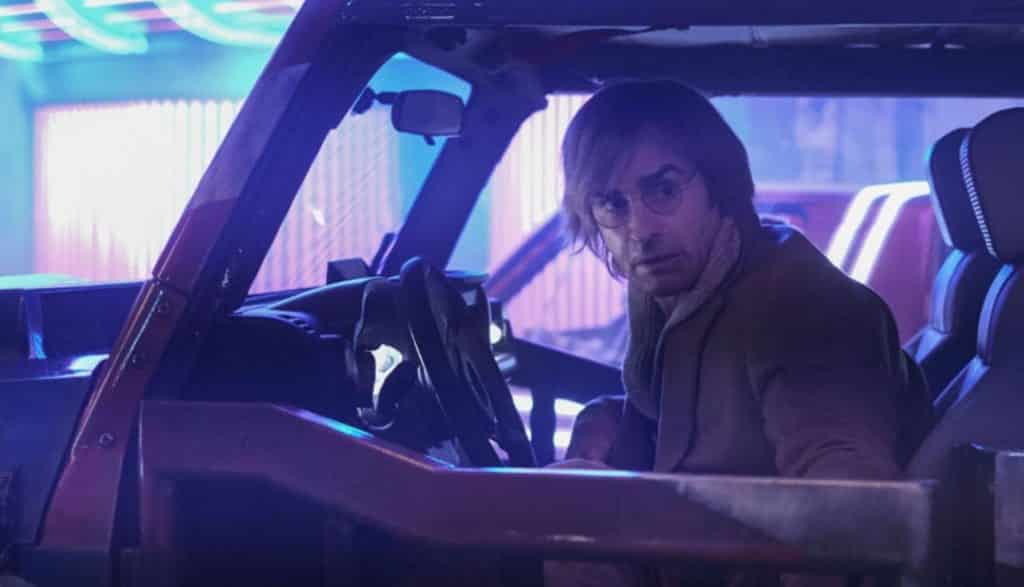Mute (2018) – Review.
There are a number of great films that have left their mark on the neo-noir-drenched corner of cinema, the colourful void in which inspiring and terrifying futures exist under bright, surreal lights. Duncan Jones is the latest to try his hand at paying respect to those that have come before while at the same time attempting to leave his own mark on the genre.
What results is a film that’s not nearly as rich as say, Blade Runner or its sequel, nor as reveting as it so hopes to be. The story follows Leo (Alexander Skarsgard), a man who as a child had a terrible accident following which his mother refused surgery on the basis of their Amish beliefs. In the present day we’re introduced to his relationship with Naadirah (Seyneb Saleh) through a first act that seems desperate to hammer home the authenticity of their love. Naadirah however, has a secret, one she’s prepared to divulge to Leo before he ensures her that, should she love and want to be with him, the secret doesn’t matter.
Given the insinuations, the reveal of the secret itself seems pedestrian in hindsight, though it provides the film with its necessary twist-reveal. That itself is handled well, and perhaps the surprise is particularly strong due to the weakness of the sequences that precede it. Naadirah of course, goes missing early in the film leaving Leo to attempt to pick up the pieces and find out what’s happened to her. To do so he has to navigate the criminal underbelly of this world. If it weren’t for a strange, somewhat out-of-place scene involving three police officers, you’d be forgiven for thinking law and order simply doesn’t exist here. It might as well not.
 So we pick up in a futuristic Berlin, bursting with neon lights and with hover cars enlivening the background. The lights fail to hide the dirt and the muck that has built up down on the ground, and most of the environments Leo walks through are trash-riddled, while the world above and around him is a dreary, cold place. The bulk of the scenes are set in the heart of the city, but we’ll cut away into single apartments or the outer skirts of the city where things look relatively modern and periodic by comparison. Every time this happens, it’s a little more jarring than the last. Still, it’s undoubtedly a lavish and detailed visual style despite it feeling not quite fleshed out enough.
So we pick up in a futuristic Berlin, bursting with neon lights and with hover cars enlivening the background. The lights fail to hide the dirt and the muck that has built up down on the ground, and most of the environments Leo walks through are trash-riddled, while the world above and around him is a dreary, cold place. The bulk of the scenes are set in the heart of the city, but we’ll cut away into single apartments or the outer skirts of the city where things look relatively modern and periodic by comparison. Every time this happens, it’s a little more jarring than the last. Still, it’s undoubtedly a lavish and detailed visual style despite it feeling not quite fleshed out enough.
Clint Mansell’s score for the film might be its best quality. It soars exactly when it needs to. Even if it adds a slightly melodramatic edge to the core relationship, it manages to inspire the kinds of emotions that Jones is aiming for. These times, early in the film and toward the very end, are about the only times where we’re truly forced to feel for Leo in one way or another – “forced” being the operative word, for nothing about the character apart from his childhood mishap screams for sympathy and Skarsgaard is simply reduced to a lanky, silent goon that belts answers out of his prey. Leo’s search for Naadirah is mundane and would be more-so if not for the colourfully-clad characters that he encounters who resemble those from popular dystopian novels à la The Hunger Games.
While Leo is on his own quest, a whole other film is taking place that only interconnects with the main storyline at rare intervals until the final act. Paul Rudd plays Cactus Bill in what is a refreshingly stern role for the naturally comedic actor. Bill is an aggressive, quick-to-temper man who is deeply devoted to his daughter even if his fatherly choices seem rather misguided at times. Bill is one of the best things about the film. His fiery personality gives it a much needed kick when he shows up, and he’s given a solid motivation for his actions. Though why he’s so eager to get out of Berlin isn’t quite as clear. As another character even tells him, he has a pretty good life.
His relationship with Duck (Justin Theroux), a fellow surgeon for the city’s shady underbelly bosses, is one of the stranger aspects of Mute. Initially it seems the two are involved intimately, though that’s apparently not the case as we dive further into their lives. The disturbing nature of certain characters is glossed over on occasion, tying only loosely to the broad, muddied themes of innocence, ignorance, childhood and parenthood that are haphazardly mashed together. At the core of these themes is Bill’s daughter, who’s equally as mute as Leo right up until the final fifteen minutes, and who is the only person Leo can actually connect with following the loss of his lady.
 How Leo is treated by others based on his predilection is rather hollow, and how he deals with his dilemma is too easy. The silent brute act is a far too prominent one in the action genre, and here it takes away from his unique inability to speak. His scenes with Naadirah successfully explore his lack of a voice. The early part of the film makes it a central topic, in a desperate attempt to have us latch onto the character. After this though, it’s an action film dressed up like a smart sci-fi film with something to say.
How Leo is treated by others based on his predilection is rather hollow, and how he deals with his dilemma is too easy. The silent brute act is a far too prominent one in the action genre, and here it takes away from his unique inability to speak. His scenes with Naadirah successfully explore his lack of a voice. The early part of the film makes it a central topic, in a desperate attempt to have us latch onto the character. After this though, it’s an action film dressed up like a smart sci-fi film with something to say.
Despite a tense and impressive climax, what comes before fails to build up sufficiently to a worthwhile crescendo. Mute meanders during parts of every act, not quite sure how to feasibly build up and then break down its characters and relate it back to a coherent plotline. The underworld aspect of futuristic Berlin is unfocused and Leo’s ability to move through its dark alleyways with ease is a striking contrast to the naivety that is so heavily implied through earlier scenes. One would assume that a man like this would have been killed quickly and efficiently, had he been giving a criminal organization this much trouble.
I applaud Jones’ ambition. Mute is a spiritual successor to 2009’s critically acclaimed Moon, as he says, and it’s the follow-up to his big-budget Warcraft adaptation. It suffered through development hell but Jones was stubborn enough to eventually make it happen. He’s spoken of a third entry into this trilogy of sorts. Should that happen, perhaps being years in development is that last thing it needs. Unfortunately, Mute leans far too heavily on the classics that have come before it, and despite its visual strengths it lacks any the polish and power of films from bygone days.
Film ’89 Verdict: 3.5/10
Mute is currently available on Netflix (regional variances may apply).

